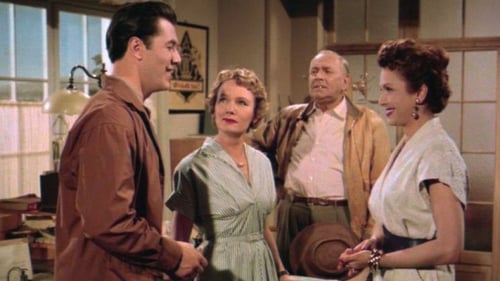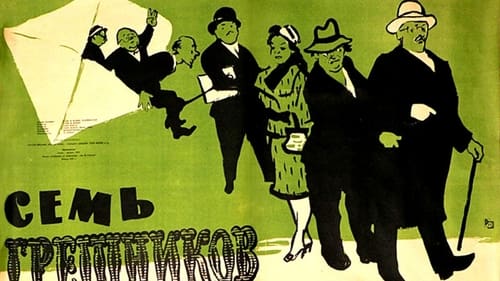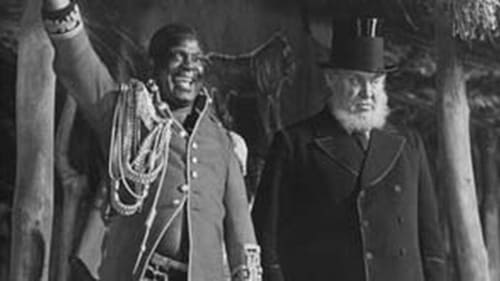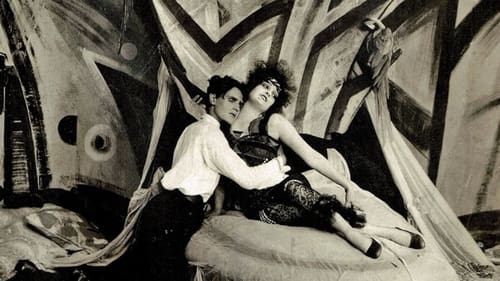Harald Paulsen
출생 : 1895-08-26, Elmshorn, Germany
사망 : 1954-08-04

Mühlenkonsort

Graf Carnero

Otto Kersten

Fritz Waldvogel
In a small town a bag with delicate letters disappears. Many of the residents are worried about their written messages. A clever sculptor uses the opportunity to play a prank.

Bertram
Postman Titus Müller returns from his daily rounds with a letter that will change the course of his modest provincial existence.

Ladislaus

Debisch (voice)
The wealthy man Tobias Knopp becomes ever more lonely and quirky over the years. He had let himself go, his girth increased significantly, and his hair fell out. Over that, he waited too long for the right woman and stayed a bachelor involuntarily. But now, he wants to try again one more time and wants to get married after all. But first of all, the right woman for this has to be found, and thus Knopp embarks on a journey to look for a wife all through the German lands. During that, he visits his friends who are already married for a long time and gets all kinds of advice from them on how to get to know a woman and to conquer her heart. On his journey, Knopp then learns much about the different facets of married life. After countless adventures, he, however, doesn’t find an adequate partner and returns home frustrated. But perhaps, his housekeeper might be able to help out?

Duellwütiger Säbelfechter

Herr Zander

Malkow

Unternehmer

»Fürst« Balbanoff

Korfiz

Haberkorn

Kriminalassistent Vogel

Jean

Otto Bollmann

Shot in 1944, finished and released in 1949.

Graf Dorndorff

Fergusson

Kern, Oberkellner

Smirnoff / Petersen, Agent

Agent Smirnoff, alias "Petersen"

Herr Heoger
1943 German film.

Hauptmann Martin von Alzey, ihr Vetter

Richard Lorenz, Friedrich Hoffmanns Neffe

Tierarzt Dr. Heinicke

Alfons Degenhardt

Eduard Boeckel

Dr. Bonnett

Kammersänger Peter Laurenz
The marriage of the celebrated operetta diva Vilma and the chamber singer Peter has come to an end. Peter, however, is intent on winning back his now ex-wife. So he’s come up with the idea of a guest performance in Venice, where the two will both appear. Vilma, however, has already found a new man – Niki. He’s a salesman and she wants to marry him. With the help of Annemarie, a friend, who has won a trip to Venice, Peter succeeds in diverting Niki, for he falls in love with Annemarie. Now the way is free for Peter to win back the ex-wife, who couldn’t care if he lived in a hole six feet underground.

Diener Georg

Französischer Außenminister
Ohm Krüger (English: Uncle Krüger) is a 1941 German biographical film directed by Hans Steinhoff and starring Emil Jannings, Lucie Höflich and Werner Hinz. The film depicts the life of the South African politician Paul Kruger and his eventual defeat by the British during the Boer War. It was the first film to be awarded the 'Film of the Nation' award. It was re-released in 1944

Vincent Benedetti
A biographical film of Otto von Bismarck, the Prime Minister of Prussia, and how he and his policies - including aggressive war - helped to unite Germany.

Flatcher
Biography of the life of the circus performer Alfredo Codona.

Robert Rossi

Jacobo

Ramon Tomasa
The cashier, Jürgen Borb, has already worked for 10 years at Dadag in Hamburg and is an example for customer service and company loyalty. His professionalism are matched by the trust of his employers, who, while relating to him in an acceptable manner professionally, desire no closer contact with him outside of the workplace. When Borb suddenly disappears one day, Dadag's directors and Borb's colleagues are surprised. They become even more surprised when they soon discover that Borb has embezzled well over a million marks from the firm. His stepsister, Mette, doesn't believe that her stepbrother is an embezzler. In the meantime, she has fallen in love with a criminal investigator, who, she believes, is simply exploiting her affections to get to Borb. Then one day, the criminal investigator finds a body in the cellar of a house Borb rented under a false name and this man created a phony ID card for Borb, identifying him as a resident of a South American country.

Paul Erdmann

Director

Director

Kriminalrat Wiegand

Smith
The stand-alone opera singer Carmen Casini dare not admit to her adult son, the spoiled race car driver Cecil, that she ruined her voice on a stormy day at the racetrack and that her career is thus at an end. Meanwhile, Cecil has fallen in love with the pretty Colette … without suspecting that her father, the wealthy Bartell, was a former lover of his mother and that he’s Cecil’s daddy. Thus, both Carmen and Bartell try to prevent the unfolding love-relationship between brother and sister, because this ain’t the Ozarks, you know! Only after the unhappy Cecil tries to commit suicide after an argument with his mother do Carmen and Bartell realize they still love one another. Suicide attempt be damned; let’s go out on a date! A movie that screams “Fun for the whole family.”

Fred Martini

Rechtsanwalt Dr. Rommel / Dr.Falke
The delightful Johann Strauss comic opera Die Fledermaus was mercilessly lampooned in this truly bizarre production. For starters, a framing device has been added: After appearing in 300 consecutive appearances of Fledermaus (which translates as The Bat) the lead tenor (Georg Alexander) imagines that he's seeing bats everywhere. Driven a bit over the edge by all this, he falls asleep and has a nightmare about the opera, with a group of non-singers cast in the leading roles. The original libretto about romantic assignations, political imprisonments and mistaken identity is burlesqued to the hilt: at one point, the hero finds out that his prison cell is surrounded by rubber tubes!

Aristide - Kassierer
The Parisian restaurant "At the Oyster King's" is looking for a new waitress, whose job would be to crack open oysters with a newfangled oyster cracker (how exciting!). But who would have thought that this newfound invention would lead to so much turmoil (they're French, aren't they?)?! Through a mix-up, Lilli Dupont gets the job. But Lilli is no waitress, but rather a talented singer, waiting in vain for an engagement. She takes the job and soon every male visitor is laying at her feet. So that Lilli doesn't constantly have to fight off all the horny men, the cashier Aristide spreads the rumor that Lilli is actually the daughter of the millionaire van Muhlen, to whom the "Oyster King" belongs (daughter of a millionaire?!? Oh yes, of course: that will dissuade potential suitors!).

Pionierhauptmann Urban

Simikry
Gabriele Bordersen, a woman from a good home, wants to see what real life is like among the common folk. With her stewardess Fanny Flint and the tour guide Simikry, she goes off to visit a sailors' bar. Fanny and Gabriele change clothes, which allows the stewardess to introduce herself as a fine lady. When Gabriele asks Fanny to leave with her, Fanny begs her to give her an hour more out of fear of embarrassment. Gabriele, however, is thrown out of the bar by the owner without money and papers; is picked up by the cops; and suffers a nervous breakdown, leading to her being sent to a hospital. No one believes in the slightest that she's really Gabriele Brodersen.

Der Baron

Rechtsanwalt Hanefeld
Der Herrscher (The Sovereign) was based on Before Sunset, a play by Gerhart Hauptmann. The great Emil Jannings stars as Mathias Clausen, a self-made businessman who is forced to do a great deal of soul-searching when his wife unexpectedly dies. Determining to start life anew, he falls in love with his secretary Inken (Marianne Hoppe) and impulsively takes a vacation to Italy. Clausen's selfish grown children, not wishing to share their father's affections -- nor his money -- with his new wife-to-be, go to court demanding that Clausen be declared mentally incompetent. Upon finding this out, Clausen flies into a rage, leaving the audience to wonder whether or not he really as gone off his trolley. Der Herrscher was directed by Veit Harlan, more famous (or notorious) for his viciously anti-Semitic Jud Suess (1940).

Enrico Falotti

MacNorris

Ossip Kaschejeff

Niemeyers Sohn
This film is a fascinating showcase for Emil Janning's theatrical play. He's a gentle school teacher who believes in his boys and is easily fooled about all things, while the other town officials want him dismissed. Curiously it's very hard to see what the film is exactly aiming for. Disaster strikes and the lax prof proves to be too far removed of the real problems of the world, on the other hand his enemies are shown in the most unsympathetic, satirical way denouncing the militaristic, bourgeois ideology of the Kaiserreich.

Michel
Ave Maria was the second film-starring vehicle for legendary operatic tenor Beniamino Gigli. Mourning the loss of the only woman he ever loved, concert singer Tino Dossi (Gigli) is temporarily shaken from his doldrums by vivacious Montmartre entertainer Claudette (Kaethe Von Nagy). Dossi doesn't realize that Claudette is merely using him to advance her own singing career. Ultimately won over by Dossi's sincerity and courtesy, Claudette falls in love with him for real, only to suffer the pangs of conscience as a result. About to kill herself, she decides instead to return to Dossi's arms, vowing never to confess her original mercenary intentions.

Jonny

Graf Hohenstein

Otto Jebs

Imre Berczy

Henry Davenport, Revueschauspieler

Peter Hüsing

Karl Franke

Dr. Fritz Neubauer

Paul Martens

Hans, ein Werkstudent

Bob

Harry Neuhoff

Jazzmusiker Frank Wellner

Frank Briggs
A crazed scientist murders his wife, walls her up, then flees. A reporter sets out to track him down. Remake of Unheimliche Geschichten (Richard Oswald, 1919).

Leopold

Bauunternehmer Stark
In the very oldfashioned town of Ostend suddenly 13 suitcases are delivered to the hotel, with a note, that O.F. will be here soon and needs 6 rooms (the hotel just has five). This event, probably the biggest in 300 years, starts a small wave of modernisation, yet everybody is wondering who O.F. is. Journalist Stix and architect Stark have an idea how to use this event. They proclaim, that O.F. is a former citizen of the town, who became a millionaire abroad. They tell their fellow citizens that the town still needs modernisation, like better hotels, nightclubs, shops, etc. And soon, Ostend is a boomtown, then a capital. The architect, responsible for the new buildings is finaly allowed to marry the mayor's daughter, while Stix marries the cabaret star and the widowed mayor his new secretary. The only problem is, O.F. hasn't shown up, while finance experts from all over the world are trying to solve the depression problem.

Sänger
This Brechtian musical about a young woman who flees from her decrepit, noble fiancé and marries a sailor is an interesting, although not a completely successful attempt to translate the sort of stage show to film. It has some good points, including the complete abandonment of the sort of surrealistic stage design that had enlivened the silent cinema. Instead, this tries for a purely cinematic technique, including multiple exposures, undercranking and distorting camera angles and lenses.

Tommy
The two happy fitters Eddy and Tommy are doing overtime to ensure the great travel-exhibition of the department store they work in is ready for display. Outside, they see a poor newspaper seller, who looks longingly at the beautiful things in the display window. So they simply decide to smuggle the unfortunate inside and compete to win her favor by giving her gifts from the shelves of the department store. In their frenzy of happiness, they don’t notice that the girl is taking the fun little game for the truth. When she realizes that she has to give back the alleged gifts, she runs away.

Burdach
Popular comedy about a flower seller who cannot afford to pay a tax for having a little dog as her companion, and the new candidate for the post of burgomaster she endangers.

Herr Linsemann

Wilhelm Meyer

Frank Braun
A scientist, Professor Jakob ten Brinken, interested in the laws of heredity, impregnates a prostitute in a laboratory with the semen of a hanged murderer. The prostitute conceives a female child who has no concept of love, whom the professor adopts. The girl, Alraune, suffers from obsessive sexuality and perverse relationships throughout her life. She learns of her unnatural origins and she avenges herself against the professor.

Max Schulz
Newlyweds Käthe and Max met while studying law. Trouble ensues when Max takes on his first case without telling his wife.

Boxer Karl

Kriminalkommissar Krenke

Toni wants to become an opera-singer. Her mother was once simple chanteuse. Toni marries the brutal industrialist Liesegang. An Italian doctor falls in love with Toni. He want's to see Liesegang dead.

A waiter in love with a countess assumes the identity of an aristocrat.

Ehrenmann hinter schwedischen Gardinen

Fredy

The film depicts the marriage between the mad Charles VI of France and his wife Queen Isabeau.

Percy Melo
Since completing a portrait of Genuine, a high priestess, Percy becomes irritable and withdrawn. He loses interest in painting and refuses to see his friends, preferring to spend his time alone with the portrait in his study. After turning down a wealthy patron's offer to buy the picture, Percy falls asleep while reading stories of Genuine's life. Genuine comes to life from the painting and escapes. The film's sets were designed by the Expressionist painter César Klein.






















